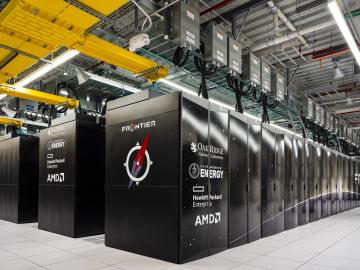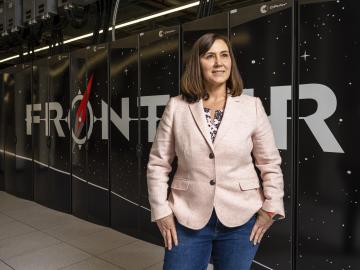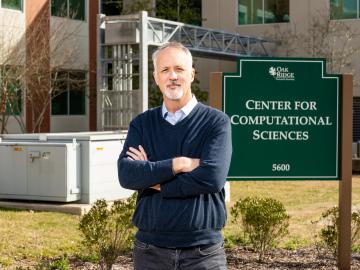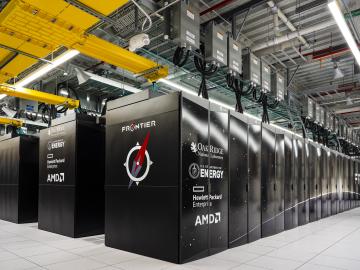
Filter News
Area of Research
News Topics
- (-) Chemical Sciences (86)
- (-) Frontier (64)
- (-) Mercury (12)
- 3-D Printing/Advanced Manufacturing (146)
- Advanced Reactors (40)
- Artificial Intelligence (131)
- Big Data (79)
- Bioenergy (112)
- Biology (128)
- Biomedical (73)
- Biotechnology (39)
- Buildings (74)
- Clean Water (33)
- Composites (35)
- Computer Science (226)
- Coronavirus (48)
- Critical Materials (29)
- Cybersecurity (35)
- Education (5)
- Element Discovery (1)
- Emergency (4)
- Energy Storage (114)
- Environment (218)
- Exascale Computing (67)
- Fossil Energy (8)
- Fusion (66)
- Grid (74)
- High-Performance Computing (130)
- Hydropower (12)
- Irradiation (3)
- Isotopes (62)
- ITER (9)
- Machine Learning (68)
- Materials (157)
- Materials Science (158)
- Mathematics (12)
- Microelectronics (4)
- Microscopy (56)
- Molten Salt (10)
- Nanotechnology (64)
- National Security (86)
- Neutron Science (171)
- Nuclear Energy (122)
- Partnerships (68)
- Physics (69)
- Polymers (35)
- Quantum Computing (53)
- Quantum Science (93)
- Security (31)
- Simulation (65)
- Software (1)
- Space Exploration (26)
- Statistics (4)
- Summit (71)
- Transportation (103)
Media Contacts

Innovations in artificial intelligence are rapidly shaping our world, from virtual assistants and chatbots to self-driving cars and automated manufacturing.

An innovative and sustainable chemistry developed at ORNL for capturing carbon dioxide has been licensed to Holocene, a Knoxville-based startup focused on designing and building plants that remove carbon dioxide

When reading the novel Jurassic Park as a teenager, Jerry Parks found the passages about gene sequencing and supercomputers fascinating, but never imagined he might someday pursue such futuristic-sounding science.

At the National Center for Computational Sciences, Ashley Barker enjoys one of the least complicated–sounding job titles at ORNL: section head of operations. But within that seemingly ordinary designation lurks a multitude of demanding roles as she oversees the complete user experience for NCCS computer systems.

The Oak Ridge Leadership Computing Facility’s Matt Sieger has been named the project director for the OLCF-6 effort. This next OLCF undertaking will plan and build a world-class successor to the OLCF’s still-new exascale system, Frontier.

With the world’s first exascale supercomputing system now open to full user operations, research teams are harnessing Frontier’s power and speed to tackle some of the most challenging problems in modern science.

As renewable sources of energy such as wind and sun power are being increasingly added to the country’s electrical grid, old-fashioned nuclear energy is also being primed for a resurgence.

Xiao-Ying Yu, a distinguished scientist in the Materials Science and Technology Division of the Department of Energy’s Oak Ridge National Laboratory, has recently been chosen for several prominent editorial roles.

A trio of new and improved cosmological simulation codes was unveiled in a series of presentations at the annual April Meeting of the American Physical Society in Minneapolis.

ORNL scientists combined two ligands, or metal-binding molecules, to target light and heavy lanthanides simultaneously for exceptionally efficient separation.


